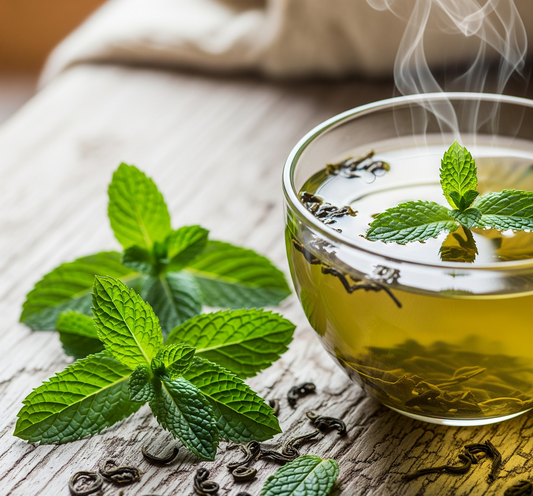Green tea, derived from the Camellia sinensis plant, is a widely popular beverage that has been used for medicinal purposes in China and Japan for centuries.
Green tea is often touted for its potential health benefits, which include promoting weight loss, improving mental alertness, and relieving digestive symptoms and headaches.
Research has also shown that green tea, and its key component EGCG, may have protective effects against heart disease and cancer.
In fact, the FDA has even approved a topical ointment called Veregen, which includes extracted components of green tea leaves and is used for the treatment of genital warts.
With all these potential benefits, it's no wonder why green tea has become such a popular dietary supplement and beverage.

Debunking Myths About Green Tea - Separating Fact from Fiction
- Green tea contains caffeine and can help prevent a decline in alertness throughout the day
- Taking only the main component of green tea, EGCG, has not been shown to improve mental capabilities
- Studies on green tea's potential health benefits, including reducing the risk of cancer and heart disease, have had inconsistent and inconclusive results
- Green and black tea may have some beneficial effects on heart disease risk factors such as blood pressure and cholesterol, but research has limitations and no definite conclusions have been reached
- Green tea extracts have not been shown to produce meaningful weight loss or help people maintain weight loss
- The FDA has approved a green tea extract ointment as a prescription drug for treating genital warts
- It is uncertain whether green tea is helpful for other conditions
- Ongoing research is being funded by the National Center for Complementary and Integrative Health, including studies on new forms of green tea extracts for preventing symptoms of inflammatory bowel disease and lowering cholesterol.

Is Green Tea Safe? What You Need to Know
- Consuming green tea as a beverage is generally considered safe, up to 8 cups per day.
- Product labels only list added caffeine and not the naturally occurring caffeine in green tea.
- Pregnant and breastfeeding women can consume up to 6 cups per day, but drinking more may increase the risk of negative effects and birth defects associated with folic acid deficiency.
- Liver problems have been reported in some people taking green tea extracts, especially those with liver disease.
- Green tea is a common ingredient in over-the-counter weight loss products, which have been linked to rare cases of liver injury.
- Green tea may interact with certain medications, such as nadolol, a beta-blocker used for high blood pressure and heart problems.
- It is important for people with liver disease to consult a healthcare provider before taking products with green tea extract.
- Discontinuing use and seeking medical attention is recommended for those taking green tea extracts and experiencing symptoms of liver trouble such as abdominal pain, dark urine, or jaundice.
- High doses of green tea may reduce blood levels and effectiveness of the drug nadolol, as well as interact with other medications.
- It is always recommended to consult with a healthcare provider before adding green tea supplements to your diet or increasing your intake significantly.

Taking Control of Your Health with Green Tea: The Importance of Communication with Healthcare Providers
It is crucial to be proactive about your health and have open communication with your healthcare providers regarding any complementary health approaches you are considering or currently using. By working together, you can make well-informed decisions that promote optimal health and wellness.
How Much Do We Know About Green Tea's Benefits?
Despite the numerous studies conducted on green tea and its extracts, it is still uncertain whether they are truly effective for the majority of their purported uses.
Further research is necessary to determine the validity of many of the claims surrounding green tea, its extracts, and their benefits.
Reference:
National Center for Complementary and Integrative Health. (2022). Green Tea. Retrieved from https://www.nccih.nih.gov/health/green-tea.





